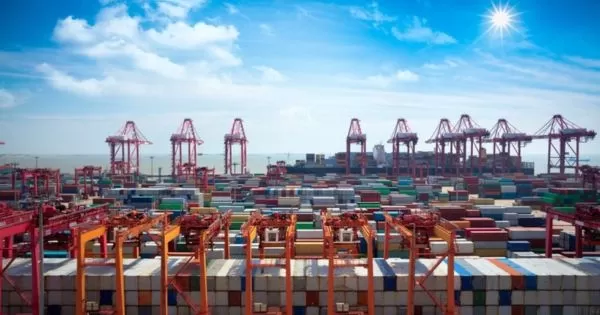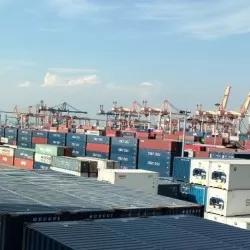Asia’s Maritime Power: China Leads, Regional Competition Intensifies
Container News’ analysis of Asia’s maritime power shows China in the lead, while other countries such as Malaysia, Japan, South Korea and Singapore are competing fiercely to improve their position.

Port of Shanghai
Based on the analysis of maritime power over the period 2021 to 2024, using indicators such as transport connectivity, port traffic and container fleet size, a number of key findings emerged, highlighting the dynamic nature of maritime competitiveness in Asia.
The analysis shows China as the strongest maritime nation by a significant margin. This dominance is attributed to China’s superior performance across all three indicators. China’s extensive maritime infrastructure, powerful ports and huge container fleet contribute to its leading position. China’s strategic investments in port development and global shipping routes have further cemented its preeminent position in the international maritime domain.
In contrast to China’s dominance, other Asian countries - Malaysia, Japan, South Korea, and Singapore—show a high degree of similarity in their maritime capabilities. This similarity highlights the fierce competition in the region, with each country striving to increase its maritime influence despite its size and capabilities. The relatively similar performance levels among these countries indicate a high level of geostrategic competition in the maritime domain.

Singapore and South Korea:
Singapore and South Korea have emerged as important players in the regional maritime landscape. Singapore has successfully stabilized its position, maintaining a strong and consistent presence in global trade. This stability can be attributed to Singapore’s strategic location, advanced port facilities, and efficient shipping services, all of which have combined to strengthen its maritime power.
In contrast, South Korea has experienced a slight decline in its maritime performance. While South Korea remains a formidable competitor, the decline suggests potential challenges or shifts in its maritime strategy.
Malaysia and Japan:
Both countries, although smaller in size compared to China, Singapore, and South Korea, have shown improvements in their indicators. Malaysia’s efforts to improve its port infrastructure and expand its container fleet are reflected in its growing maritime power. Similarly, Japan has managed to strengthen its maritime position through strategic investments and upgrading its port and fleet operations.
Geostrategic Implications:
These findings underscore the strategic importance of maritime power in the Asian region. China’s dominance in maritime trade highlights its influential role in shaping global shipping routes and trade dynamics.
While China remains the undisputed leader in maritime power, the relative competitiveness of other Asian nations reveals a dynamic and evolving maritime landscape. The ability of these nations to adapt and innovate to address changing global trade patterns will be critical in determining their future position in the maritime arena.
Source: Phaata.com (via Container-News)
Phaata.com - Vietnam's First International Logistics Marketplace
► Find Better Freight Rates & Logistics Services!

























.webp)







.webp)
.webp)
.webp)







